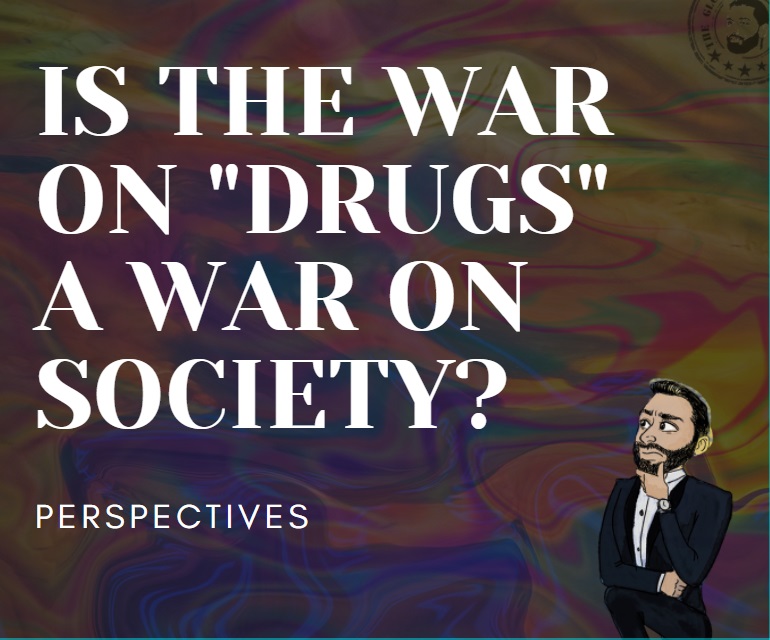Civilisation & Drugs-The Hidden Truth
For most, the notion of psychedelics brings to mind Goa in the 1970s or the Beatles sitting crossed legged, beads in hand exploring the yellow submarine of sorts. However despite the propaganda of the notion of left field hippies, there is a growing movement of change that is dispelling the previous connotation of its uses.
This week on the Global Indian Series Podcast, I interviewed the real life medicine man Dr Yashpal in Costa Rica. Dr Yashpal believes that psychedelics should be our birthright and that under ritual conditions, they can bring us closer to the divine and advance the human experience for all.
Dr. Yashpal Jayne is the founding bishop of the Essene Order of Natural Mystics and the International Alliance of Natural Mystics, based in Costa Rica. He is the Medical Director of the Entheogenic and Natural Health Centre.
A devout Catholic (albeit a highly unorthodox one for most) for him taking psychedelic drugs, particularly DMT (more on which anon) should be added to the Seven Sacraments of Catholicism: Baptism, Confirmation, Eucharist, Reconciliation, Anointing of the Sick, Matrimony, and Holy Orders.
He prefers the term ‘Enthenogen.’Coined in 1979, it is a psychoactive substance which alters consciousness for spiritual purposes. The adjective entheos means "full of the god, inspired, possessed", and interestingly is the root of he word "enthusiasm.”
But the idea of psychedelics unlocking our potential is not a new one, in the past I personally experimented with magical assortments whilst studying hypnotherapy. So it got me thinking about how the ideas of psychedelics impacts our notions of Identity.
So let me deep dive you in to a wonderful world, that I believe will challenge your thought on modern day culture and our roots from the medicinal herb.
Graham Hancock-the man TED Banned
Over this week’s podcast one man casts a shadow. Step forward Graham Hancock.
Ted Talks banned him, the BBC tried to discredit him. Many academics hate him. Graham Hancock, maverick archaeologist and best-selling author, is something of a controversial figure. Because he dares to think the unthinkable, he has his fair share of detractors who dismiss his work as mere pseudo-science.
In 2000, the BBC made a programme whose express intention was to discredit his name. But the Broadcasting Standards Commission found that the programme was unfair and the BBC was formally censured.
Then in 2005 Ted invited him to give a talk. A fortnight later they banned the video and removed it both from its website and YouTube, claiming that what he had put forward was nothing but pseudo-science.
This was not so (in fairness to Hancock his ideas, though unconventional, do rest on sound science) and TED issued a formal apology and reinstated the video.
Talking Point: even if he had advanced ‘pseudo-scientific’ ideas, by what right does Ted say what can and cannot be said on its platform?
Hancock believes that vested interests are preventing mankind from achieving its full potential. Society wants us to conform. It is in its interest to do so. Toe the line, do as you are told, think as others think, and if you’re good, if you’re diligent, then you’ll get the toys of success: money, status, big flat screen televisions. The works.
Our education system, while not without its good points, is expressly designed to prepare our children for a world of 9 to 5, a world of unquestioning mass consumption, sweetened by the sugary pap of pop culture and sated by bread and circuses. Such, at any, rate is what Hancock believes. And much of what he has to say is very persuasive.
Throwing Open The Doors of Perception
Today we ask:
Should we be allowed to take drugs for sacred purposes?
Should the powers that be have the right to control what we put into our bodies, even if so doing causes no harm to others?
Should our society be able to throw us into prison if we alter our state of consciousness in this fashion?
This in turn leads to a supplementary question: how truly free are we? Jean-Jacques Rousseau famously said: “Man is born free and everywhere is in chains.” Perhaps the ultimate freedom lies in the way in which you experience the world. So if the law forbids you to take psychotropic drugs, not for recreation, but in the pursuit of the Divine, then is this an infringement of your rights? Or is it quite right that it is mostly against law and frowned upon? After all drugs do great harm and so do the Drug Cartels that peddle them.
Drugs & the Dawn of Civilsation
Drugs have been consumed for sacred purposes since the Upper Palaeolithic. So says Hancock and indeed many distinguished scholars such as David Lewis-Williams, Professor Emeritus at the University of the Witwatersrand in South Africa. Sharada Srinivasan of the National Institute of Advanced Studies agrees, although she does not fully subscribe to the hypothesis.
Many religions through the ages have used drugs for scared purposes. In Europe, one thinks of The Eleusinian Mysteries and The Delphic Oracle where the Pythoness (Priestess) inhaled vapours that arose from the earth.
Hinduism has a long association with drugs. The Vedic scriptures speak of 'Soma', a draught or plant which was ritualistically consumed. To the Zoroastrians of Iran it was known as ‘haoma”.
Staying in India, bhang and bhang Lassi (a preparation made from cannabis flowers) has long been consumed and is considered by many to be a sovereign remedy for all manner of diseases.
It is held scared by the Hindus. Weed is also ritually consumed or smoked by Naga Sadhus. Cannabis, from which it is made, was theoretically banned in India in1961 but in practice it is widely consumed and remains a very important part of Indian life, both scared and profane. Crucially, bhang was excluded from the definition of cannabis and therefore it can be lawfully consumed today.
Not so weed, though realistically to stamp out its use in India is neither practical nor perhaps desirable, given its cultural importance.
HEADLINES READ: 7.2 Million Indians are addicted to Cannabis
A 2019 report by the National Drug Dependent Treatment Centre under AIIMS claimed that about 7.2 million people in India are addicted to it, (much can be stated though on the openness of the research and the exact definition of addiction). The same report further noted that it is the poor (slum dwellers, daily wage workers and Untouchables) who are more likely to be arrested for possession of cannabis. It should be noted harsher recreational drugs such as heroin is a deep concern in areas including Punjab.
A small note to my “friends” in the Indian Government who undoubtedly will be reading this. The Indian Judiciary should perhaps show greater mercy and understanding towards poor cannabis users, whose name in India is legion. Also just out of sombre curiosity how can it be criminalised and permitted at the time? Welcome to the organised chaos that is our world, I hear you say.
Is this state of affairs right? The law should apply to all, not just the poor. Should Big Government have the right to interfere in the way in which someone worships? A Christian is allowed to drink Wine in a church as an anointed ritual of worship – which for some is classed as a drug. So why is a Hindu or Rastafarian then treated in contempt for practicing similar religious rites?
And as Hinduism is seen as a way of life rather than an organised religion of sorts is it fair for a Government to try and mantle it self as the self-appointed social custodians of an entire culture? Case point India and Nepal, a personal note for another article perhaps.
The other question posed would be: if the humble herb is a gateway to the divine, then by banning are we stopping the personal expression by painting the word addiction. Would you in the same way claim a person is addicted to meditating, or bathing in a river for example? I know there is an argument for social or economic impact of one or the other – but the idea remains attached. Who or I should say when did one’s culture become the dominating way of thought globally? Much can be said of the old conservatism of Colonial Britain, and radicalism in how religions have been readjusted to divert our concepts of success, freedom and use of ceremony.
“Stoned for 17 years”
Which brings us back again to Graham Hancock. Unlike many academics, he makes a point of experiencing the effects of plant medicine first hand. He says he was ‘stoned for 17 years’ Then he journeyed to the Amazon. There the indigenous people of the Amazonian Basin gave him ‘ayahuasca’ (Banisteriopsis caapi), a psychoactive brew which contains DMT (N-Dimethyltryptamine)
https://www.bbc.co.uk/news/magazine-27203322
The shamans long ago learnt to mix it with chacruna (Psychotria viridis) , a vine which turns off an enzyme in the stomach that renders it inactive. They worship it as ‘Mother Ayauasca.’
Hancock Divides Opinion
Many academics hate Hancock. Indeed, Some have sought to damage his reputation, sometimes in a most hurtful and personal fashion. Most of them subscribe to a materialist reductionist view of the universe where everything is reduced to matter. These are people for whom the idea that there is anything beyond consciousness is unthinkable and unscientific. For them, the wondrous mystery of consciousness is an epiphenomenon of brain activity.
Hancock and many others take issue with this. Where do you stand?
The Quantum Leap of the Upper Palaeolithic
Between 100 000 and 40 000 years ago something strange happened to our ancestors. (Apart from leaving a pool of culture and participating in swamp like activities something I still often try to do whilst travelling.) Incidentally, this was long after we had evolved into Homo sapiens sapiens, anatomically speaking at least. What happened was this: the Holocene saw the emergence of mankind as a species able to use symbols and abstract ideas. In short, it marked the start of a revolution in human consciousness.
Plant Medicine
It was at this time that our forebears in the Upper Paleolithic began to make art. His hypothesis (and that of a number of eminent, but academically daring scholars) is that this great change came about because of the consummation of certain psychotropic plants: ayahuasca in South America, Iboga in parts of Africa and certain mushrooms in Europe.
Intrigued by this possibility, Hancock journeyed to the Amazon where there are tribe who drink a visionary brew which they call ayahuasca and which contains DMT. Taking the leaves of a plant chacruna they mix with a vine and by so doing they turn off the inhibitor, which ordinarily switches it off in the stomach. .
It taste horrible and smells worse, but it sends you to other realms and throws open the doors of perception. It was like a hidden switch went on his mind.
Shamanism
The use of hallucinogenic plants appears to coincide with the beginnings of shamanism. By means of ayahuasca and other substances taken around the world, shamans entered the spirit world and returned with wisdom imparted by supernatural beings.
It is worth noting that people around the world report seeing similar visions to the tribes of the Amazonian basin. Many encounter supernatural beings who act as psychopomps or guides, much like Vergil in ‘The Divine Comedy.”
Part of something Larger
Hancock’s does not take the view that psychedelics should be used for mere recreation. Instead, they should be used for higher purposes. He claims that the medicine made him realize that we are not just part of a finite dot on the earth, but that there is something larger - An awe inspiring reality of which he had no idea.
Although dangerous, it may have certain therapeutic effects in treating depression. The main active ingredients in Ayahuasca — DMT and β-carbolines — have been shown to exhibit neuroprotective in some studies. It can be highly effective in helping heroin and cocaine addicts give up hard drugs. You set a thief to catch a thief.
Deeply critical of conventional scientific community, most of whom are materialist reductionists who will have no truck with spiritual realms. Instead, he turns to the ancients and in particular the Egyptians who made a cult of death for the better part of 3ooo years. There is strong evidence that they too took visionary plants such as the hallucinogenic Blue lotus and poppy to draw closer to the Divine.
We moderns mistrust visionary states. Our society has little to say about altering consciousness as entering the spirit realm, unlike the ancients. Indeed, most countries will arrest you if you are found to have to possess DMT or LSD. Given that it can cause death, this is perhaps not unexpected. In 2014 a British Back-packer, Henry Miller, died after drinking it as part of a tribal ritual: https://www.theguardian.com/uk-news/2014/apr/27/british-backpacker-dies-hallucinogenic-drug-colombia
Hypocrisy
Not all drugs are illegal. Big pharma make billions from by selling drugs such Valium, Prozac and Ritalin. These, apparently, are alright.
Ditto for the big tobacco companies. Ditto for the drinks industry.
Britain in particular has a big problem with alcohol. For many Brits, drinking is the main way in which they have fun of a weekend, likewise in South Africa and Guyana.
Then there is coffee, tea, sugar, even social media and smart phones-in one way or another we are all drug addicts.
So drugs are permissible only when the powers that be say so. This, I suppose, is not unreasonable. But it is surely right and proper that we question the status quo and call out the hypocrisy of Government and Big Business.
A War on Consciousness?
So much for drugs. Let us turn to the sovereignty of consciousness.
There is a war on sovereignty in society-so says Graham Hancock. But a sovereignty, not of nation-states, but sovereignty of consciousness itself.
His argument goes a bit like this: Western society values one particular state of conscious above all others-what he terms an alert problem-solving state of consciousness. Such a state is tailor-made for business, routine science, logic, politics, the workplace, and banking. In short, it's the state our civilisation favours for the everyday day world. And it is a form of mind-control.
He says this way is flawed and that we need to think long and hard about this way of being. After all, this state of consciousness has not always served as well. It has failed to solve the ills of the world: the scourge of famine, the decimation of the Amazon, the unsustainability of mass consumerism, climate change and the horrors of war. These, alas, are still very much with us. All the king's horses and all the King’s men can barely agree on what should be done to protect the world, much less solve its problems.
Maybe, it is high time we see the error of our ways. Perhaps there is more to our post-industrial, technology-obsessed world. Perhaps the ancients were right.
If the very essence of our cultural exchanges are from the use of psychedelics, then maybe rendering it illegal, is far from being progressive and indeed could be a collective danger to humanity.
-------------------------------










